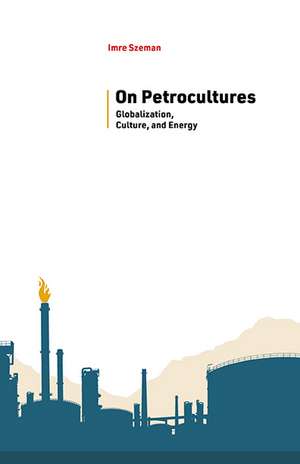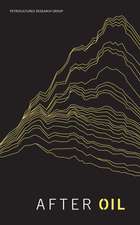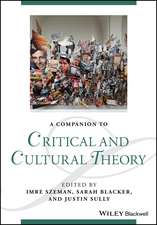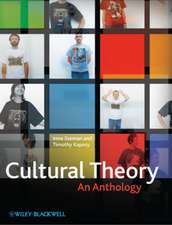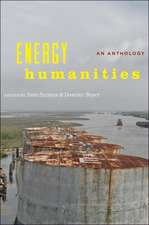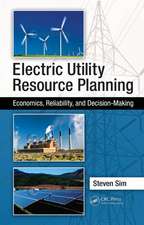On Petrocultures: Globalization, Culture, and Energy: Energy and Society
Autor Imre Szemanen Limba Engleză Paperback – 25 mar 2019
On Petrocultures brings together key essays by Imre Szeman, a leading scholar in the field of energy humanities and a critical voice in debates about globalization and neoliberalism. Szeman’s most important and influential essays, in dialogue with exciting new pieces written for the book, investigate ever-evolving circuits of power in the contemporary world, as manifested in struggles over space and belonging, redefinitions of work and individual autonomy, and the deep links between energy use and climate change.
These essays explore life lived in the twenty-first century by examining critically the vocabulary through which capitalism makes sense of itself, focusing on concepts like the nation, globalization, neoliberalism, creativity, and entrepreneurship. At the heart of the volume is the concept of “petrocultures,” which demands that we understand a fundamental fact of modern life: we are shaped by and through fossil fuels. Szeman argues that we cannot take steps to address global warming without fundamentally changing the social, cultural, and political norms and expectations developed in conjunction with the energy riches of the past century. On Petrocultures maps the significant challenge of our dependence on fossil fuels and probes ways we might begin to leave petrocultures behind.
These essays explore life lived in the twenty-first century by examining critically the vocabulary through which capitalism makes sense of itself, focusing on concepts like the nation, globalization, neoliberalism, creativity, and entrepreneurship. At the heart of the volume is the concept of “petrocultures,” which demands that we understand a fundamental fact of modern life: we are shaped by and through fossil fuels. Szeman argues that we cannot take steps to address global warming without fundamentally changing the social, cultural, and political norms and expectations developed in conjunction with the energy riches of the past century. On Petrocultures maps the significant challenge of our dependence on fossil fuels and probes ways we might begin to leave petrocultures behind.
| Toate formatele și edițiile | Preț | Express |
|---|---|---|
| Paperback (1) | 177.58 lei 3-5 săpt. | |
| West Virginia University Press – 25 mar 2019 | 177.58 lei 3-5 săpt. | |
| Hardback (1) | 588.92 lei 6-8 săpt. | |
| West Virginia University Press – mai 2019 | 588.92 lei 6-8 săpt. |
Preț: 177.58 lei
Nou
Puncte Express: 266
Preț estimativ în valută:
33.98€ • 35.28$ • 28.34£
33.98€ • 35.28$ • 28.34£
Carte disponibilă
Livrare economică 04-18 martie
Preluare comenzi: 021 569.72.76
Specificații
ISBN-13: 9781946684882
ISBN-10: 1946684880
Pagini: 288
Dimensiuni: 140 x 216 x 20 mm
Greutate: 0.39 kg
Ediția:1st Edition
Editura: West Virginia University Press
Colecția West Virginia University Press
Seria Energy and Society
ISBN-10: 1946684880
Pagini: 288
Dimensiuni: 140 x 216 x 20 mm
Greutate: 0.39 kg
Ediția:1st Edition
Editura: West Virginia University Press
Colecția West Virginia University Press
Seria Energy and Society
Recenzii
"The 'crisis in the humanities' has become a refrain in the media and in academia, but Imre Szeman is more concerned in his work with what the humanities can do to address a much larger crisis: nothing less than the future of the planet. The essays in On Petrocultures represent the remarkable range of an innovative scholar whose insights into how we live in the world are fueled at once by a sense of urgency and deep compassion. This work illustrates what the humanities can contribute to a cross-disciplinary conversation that is long overdue."
Priscilla Wald, Duke University
Priscilla Wald, Duke University
“Every essay in On Petrocultures is a gem. Szeman is making real arguments about policy’s relationship to culture around energy and environment, and in that sense he is modeling a collaborative public humanities practice. This is what the field of environmental humanities will and should be doing in the coming decades, and Szeman is doing it now."
Stephanie Foote, editor of Histories of the Dustheap: Waste, Material Cultures, Social Justice
Stephanie Foote, editor of Histories of the Dustheap: Waste, Material Cultures, Social Justice
“Excellent and provocative.”
ariel: A Review of International English Literature
Notă biografică
Imre Szeman is University Research Chair of Communication Arts at the University of Waterloo. His recent books include After Oil (West Virginia University Press), Energy Humanities: An Anthology, and Fueling Culture: 101 Words for Energy and Environment.
Textul de pe ultima copertă
On Petrocultures brings together key essays by Imre Szeman, a leading scholar in the field of energy humanities and a critical voice in debates about globalization and neoliberalism. Szeman’s most important and influential essays, in dialogue with exciting new pieces written for the book, investigate ever-evolving circuits of power in the contemporary world, as manifested in struggles over space and belonging, redefinitions of work and individual autonomy, and the deep links between energy use and climate change.
These essays explore life lived in the twenty-first century by examining critically the vocabulary through which capitalism makes sense of itself, focusing on concepts like the nation, globalization, neoliberalism, creativity, and entrepreneurship. At the heart of the volume is the concept of “petrocultures,” which demands that we understand a fundamental fact of modern life: we are shaped by and through fossil fuels. Szeman argues that we cannot take steps to address global warming without fundamentally changing the social, cultural, and political norms and expectations developed in conjunction with the energy riches of the past century. On Petrocultures maps the significant challenge of our dependence on fossil fuels and probes ways we might begin to leave petrocultures behind.
These essays explore life lived in the twenty-first century by examining critically the vocabulary through which capitalism makes sense of itself, focusing on concepts like the nation, globalization, neoliberalism, creativity, and entrepreneurship. At the heart of the volume is the concept of “petrocultures,” which demands that we understand a fundamental fact of modern life: we are shaped by and through fossil fuels. Szeman argues that we cannot take steps to address global warming without fundamentally changing the social, cultural, and political norms and expectations developed in conjunction with the energy riches of the past century. On Petrocultures maps the significant challenge of our dependence on fossil fuels and probes ways we might begin to leave petrocultures behind.
